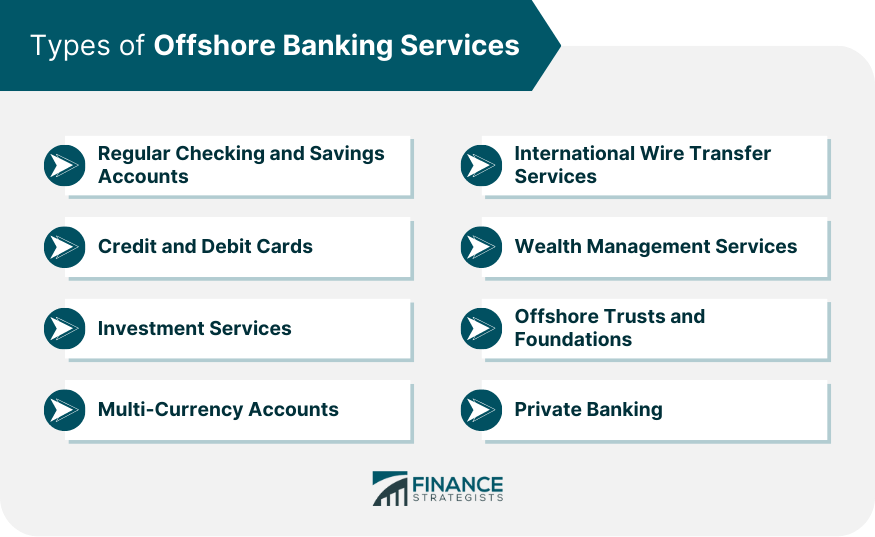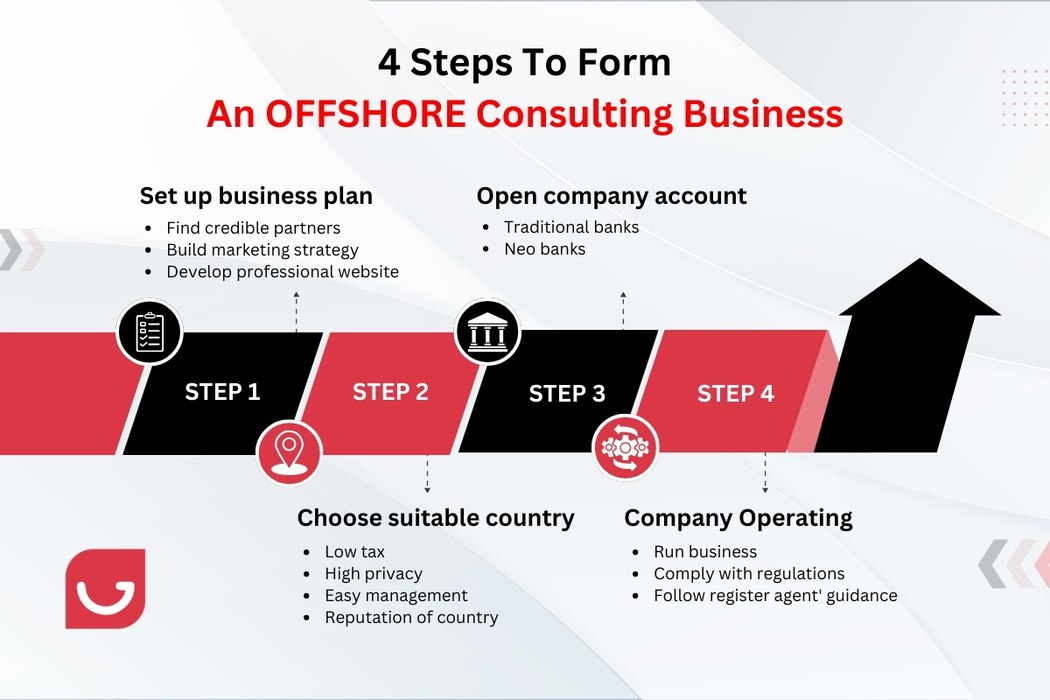How Offshore Firm Formations Job: A Detailed Introduction for Business Owners
Offshore business formations can supply considerable advantages for entrepreneurs seeking tax optimization and property protection. The procedure includes multiple essential actions, starting with mindful jurisdiction choice and extensive paperwork preparation. Engaging expert services is vital for conformity. Lots of ignore the recurring responsibilities that adhere to first registration. Understanding these complexities can make a significant difference in leveraging overseas chances properly. The next steps are necessary for long-lasting success.
Comprehending Offshore Companies: What They Are and Why They Matter
Although the concept of overseas companies might appear complex, comprehending their basic nature and value is necessary for both businesses and people seeking to enhance their financial methods. Offshore companies are entities registered outside the person's country of residence, usually in jurisdictions that supply desirable regulatory atmospheres. These services can supply numerous advantages, such as tax obligation optimization, possession defense, and boosted personal privacy.
For entrepreneurs, developing an offshore company can promote international trade, decrease operational prices, and increase market reach. In addition, overseas business often enable structured conformity with global regulations. Individuals might also make use of overseas frameworks to secure personal properties from political or economic instability in their home nations. Inevitably, the allure of overseas companies lies in their capacity to enhance monetary adaptability and provide calculated benefits in a significantly interconnected worldwide economic situation - Offshore Company Formations. Understanding their operational structure and benefits is important for making informed choices
Picking the Right Territory for Your Offshore Business
Picking the ideal territory for an offshore company is important for taking full advantage of tax obligation advantages and guaranteeing compliance with local laws. Various jurisdictions supply varying tax obligation incentives and regulatory atmospheres that can substantially impact business procedures. As a result, a careful analysis of these elements is essential for notified decision-making.
Tax Obligation Benefits Overview
When taking into consideration the facility of an offshore firm, comprehending the tax advantages linked with different territories is essential. Various areas provide special benefits, such as low or absolutely no business tax obligation rates, which can considerably boost productivity. Some jurisdictions give tax obligation motivations for details sorts of businesses, drawing in entrepreneurs looking for decreased tax obligation liabilities. Furthermore, specific nations enforce beneficial tax treaties that reduce dual taxation on global income, making sure that companies keep more earnings. The option of jurisdiction also affects value-added tax obligation (VAT) and other local taxes. Entrepreneurs need to evaluate these factors carefully to choose a place that aligns with their company goals, maximizing tax efficiency while remaining compliant with global regulations.
Regulatory Environment Considerations
Selecting the ideal territory for an offshore company calls for an extensive understanding of the regulatory setting, as various nations enforce differing levels of compliance and governance. Entrepreneurs have to review factors such as lawful structures, tax policies, and reporting obligations. Jurisdictions like the British Virgin Islands and Cayman Islands are typically preferred for their business-friendly legislations and marginal reporting needs. Conversely, some countries might enforce strict laws that can make complex operations and boost prices. In addition, the political stability and track record of a jurisdiction can affect the long-term practicality of the overseas firm. Mindful consideration of these regulative facets is vital to ensure that the selected jurisdiction lines up with the company's calculated objectives and operational needs.
Functional Preparing the Needed Documents
Preparing the required paperwork is an essential action in the offshore company development procedure. Entrepreneurs have to collect numerous lawful and identification papers to facilitate their business's facility in a foreign jurisdiction. Normally, this consists of an in-depth business plan outlining the firm's purposes and functional techniques. Furthermore, individual recognition records, such as keys or chauffeur's licenses, are required from the business's investors and supervisors.
In many situations, proof of address, like utility costs or financial institution statements, is essential to validate the identifications of the entailed events. Certain kinds dictated by the territory, consisting of application forms for enrollment, must be finished precisely. Some jurisdictions may also need an affirmation of the nature of company tasks and compliance with neighborhood policies. Extensively preparing these papers guarantees a smoother registration procedure and aids alleviate possible delays or problems, inevitably establishing a strong structure for the offshore entity.
Involving Expert Services for Offshore Development
Involving professional solutions in overseas development can greatly boost the performance and efficiency of the procedure. Business owners often deal with intricacies that can be overwhelming, making experienced advice invaluable. Specialist companies specializing in offshore formations supply a wide range of expertise concerning territory selection, company structure, and regional market problems.
These specialists can help in preparing necessary documentation, ensuring accuracy and conformity with details requirements. They likewise aid streamline communication with local authorities, decreasing the possibility of misunderstandings or hold-ups. In addition, specialist solutions can provide understandings into strategic advantages, such as tax benefits and asset defense, customized to the entrepreneur's details requirements.
Navigating Regulatory Conformity and Legal Demands
Comprehending the regulative landscape is crucial for business owners starting on offshore firm developments. Compliance with regional legislations and worldwide guidelines is vital to stay clear of legal risks. Each territory has certain needs concerning firm registration, reporting, and taxation, which should be completely investigated.
Business owners must familiarize themselves with the laws regulating business structure, ownership, try this site and operational practices in the picked offshore place. Furthermore, anti-money laundering (AML) and know your consumer (KYC) guidelines usually apply, requiring appropriate paperwork and verification processes.
Engaging with attorneys who focus on overseas services can provide invaluable advice on steering via these complexities. Making certain conformity not just shields the business from potential lawful concerns but additionally enhances credibility with regulators, companions, and capitalists. By adhering to the prescribed legal frameworks, entrepreneurs can efficiently leverage the benefits of offshore company formations while reducing risks connected with non-compliance.
Setting Up Financial and Financial Accounts

Once an ideal bank is determined, business owners typically need to prepare and send various files, including proof of identification, business enrollment records, and a description of the desired organization activities. (Offshore Company Formations)
Some financial institutions might likewise need a minimal down payment to open an account. Entrepreneurs need to be prepared to address questions concerning the source of funds and organization procedures. By completely understanding the financial landscape and adhering to the bank's requirements, entrepreneurs can secure their overseas company has seamless access to essential financial solutions for reliable procedure.
Keeping Your Offshore Company: Continuous Duties and Ideal Practices
Keeping an overseas business involves several ongoing duties that are vital for conformity and operational integrity. Trick facets include sticking to annual conformity needs, maintaining accurate financial records, and recognizing tax obligation responsibilities. These components are vital for ensuring the company's longevity and lawful standing in its territory.
Yearly Conformity Requirements
While establishing an overseas business uses various benefits, it additionally entails continuous duties that can not be overlooked. Annual compliance demands differ by jurisdiction but typically include sending yearly returns and economic statements to regional authorities. Business should also pay yearly costs, which can consist of registration renewals and taxes, depending on the place. On top of that, several territories learn the facts here now need preserving a licensed office and a local agent. Failing to follow these policies can result in penalties, consisting of penalties and even dissolution of the company. Business owners should also recognize any kind of adjustments in neighborhood laws that may influence their compliance commitments. Remaining informed and organized is necessary for maintaining the advantages of an overseas company while meeting lawful obligations efficiently.
Keeping Financial Records
Conformity with annual needs is just component of the recurring responsibilities connected with offshore business administration. Maintaining precise financial documents is vital for assuring openness and liability. Entrepreneurs must methodically record all transactions, including revenue, expenses, and possessions. This technique not just aids in interior decision-making yet additionally prepares the firm for prospective audits from governing authorities.
Regularly updating economic declarations, such as profit and loss accounts and balance sheets, is important for tracking the business's financial wellness. Using accountancy software application can improve this process, making it much easier to maintain and generate reports conformity. Furthermore, entrepreneurs need to take into consideration seeking professional audit solutions to assure adherence to regional regulations and best techniques, thereby securing the honesty and reputation of their overseas operations.

Tax Obligation Responsibilities Review
Steering via the complexities of tax obligations is necessary for the effective management of an offshore business. Entrepreneurs have to understand the tax obligation regulations of both their home nation and the territory where the overseas entity is developed. Conformity with local taxes legislations is essential, as failure to adhere can lead to fines or legal issues. Regularly submitting essential tax obligation returns, also when no tax obligation may be owed, is often called for. In addition, preserving precise and updated monetary records is essential for showing conformity. Inquiring from tax experts knowledgeable about global tax legislation can help browse these responsibilities efficiently. By carrying out best practices, business owners can assure that their overseas find this procedures remain legitimately compliant and financially viable.

Regularly Asked Concerns
For how long Does the Offshore Business Formation Refine Commonly Take?
The overseas company development procedure typically ranges from a couple of days to a number of weeks. Factors influencing the timeline include jurisdiction, documents needs, and responsiveness of lawful and financial organizations associated with the configuration.
What Are the Expenses Connected With Maintaining an Offshore Business?
The expenses linked with preserving an overseas business can vary commonly. They typically consist of yearly enrollment fees, compliance prices, accounting services, and possible legal fees, relying on the jurisdiction and certain service activities involved.
Can I Open Up a Personal Checking Account for My Offshore Firm?
Opening up a personal checking account for an offshore firm is typically not permitted. Offshore accounts should be service accounts, mirroring the firm's tasks, thereby abiding by laws and ensuring proper economic monitoring and legal accountability.
Are There Limitations on Foreign Possession of Offshore Companies?

What Takes place if I Fail to Abide With Offshore Rules?
Failing to follow offshore guidelines can lead to severe charges, consisting of substantial fines, loss of service licenses, and prospective criminal charges. In addition, non-compliance might result in reputational damages and difficulties in future company procedures.
Offshore business are entities signed up outside the person's nation of residence, frequently in jurisdictions that offer beneficial governing atmospheres. Picking the ideal territory for an overseas company is critical for making the most of tax advantages and guaranteeing compliance with regional policies. When considering the establishment of an overseas firm, comprehending the tax advantages associated with various territories is essential. Selecting the best territory for an offshore firm needs a complete understanding of the regulatory setting, as different countries impose varying degrees of compliance and governance. Additionally, the political security and reputation of a territory can affect the long-lasting viability of the overseas firm.